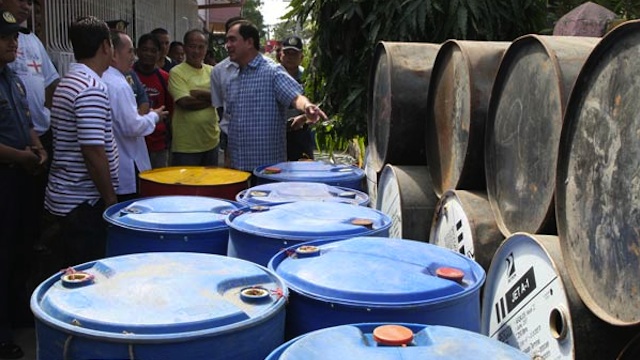SUMMARY
This is AI generated summarization, which may have errors. For context, always refer to the full article.

MANILA, Philippines – Importing oil and other goods will now go through a new anti-smuggling process that customs collectors will implement and will be made accountable for.
In a statement on Monday, April 15, the Department of Finance (DOF) said the new anti-smuggling tools were stipulated in the Department Order that authorizes its attached agency, Bureau of Customs, to implement a new set of measures to help curb smuggling of oil and other products.
The new tools include:
- port accreditation
- submission of rolling import plans by importers
- trade statistics reconciliation
- special monitoring of oil smuggling cases
“The effects of smuggling are observable in the daily lives of Filipinos, so our Department cannot be satisfied until they have been wiped out. This order will no doubt strike a heavy blow against those who do not do business fairly in the Philippines,” Finance Secretary Cesar Purisima said.
Port accreditation
According to the DOF, Customs needs to accredit only particular ports for sensitive commodities such as oil, steel, grains, tiles, gold and vehicles, subject to standards, technical requirements and applicable laws, rules and regulations.
This will be a deterrent to “port shopping” observed by importers that frequently change ports of entry in order to avoid tax, the Finance department said.
The DOF is also requiring accredited ports to submit to the DOF monthly trade statistical reports.
The data will be verified with the Department of Energy (DOE), Philippine Ports Authority (PPA), and other relevant agencies, on a per-volume and per-vessel basis to eliminate discrepancies.
Port accreditation will take next month, the Finance department also said.
Oil imports
Data from the Energy department showed that in 2011, oil demand hit 106.9 million barrels against actual Customs oil imports of only 67.6 million barrels or a gap of 39.3 million barrels.
The Order will also require all importers of sensitive commodities to submit their annual rolling import plan indicating quantity, type, source and location of intended port arrival, the Finance department said.
The Order calls for the strict implementation of Revenue Regulation No. 2-2012, which requires importers to pay value-added tax and excise tax on all oil imports upon arrival in the Philippines as well as submission of Income Tax Return as received by the Bureau of Internal Revenue (BIR).
The Finance department is implementing stricter measures against oil smuggling after major oil players including Petron Corp. and Pilipinas Shell Petroleum Corp. said that smuggling has been affecting their business. – Rappler.com
Add a comment
How does this make you feel?
There are no comments yet. Add your comment to start the conversation.